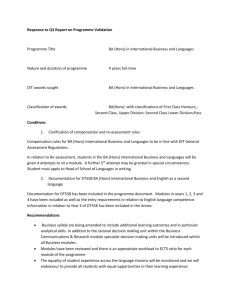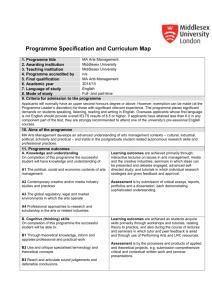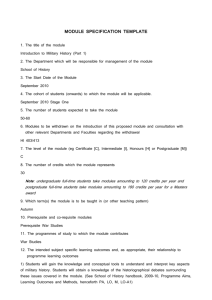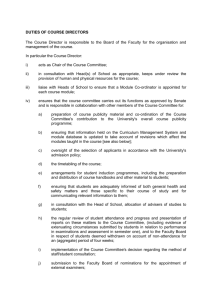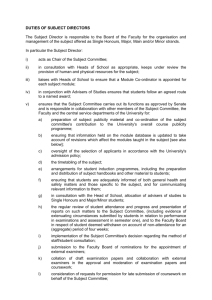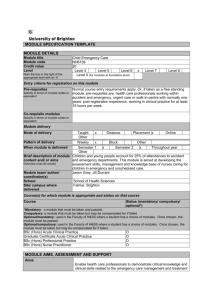BA (Hons) Industrial Relations and Human
advertisement
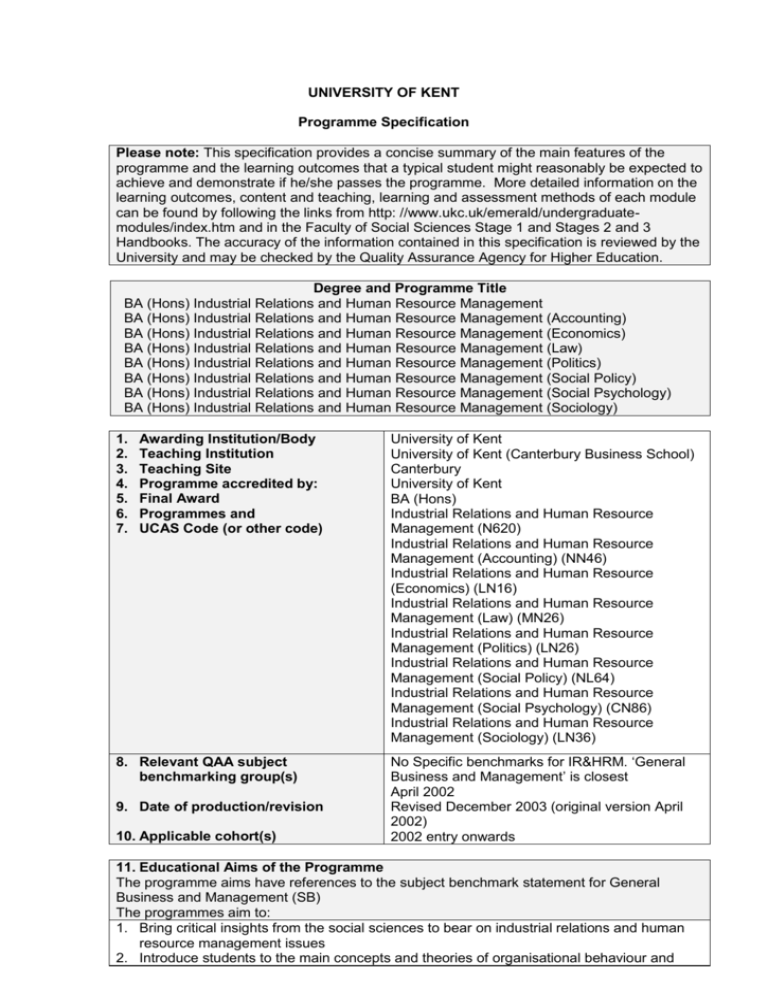
UNIVERSITY OF KENT Programme Specification Please note: This specification provides a concise summary of the main features of the programme and the learning outcomes that a typical student might reasonably be expected to achieve and demonstrate if he/she passes the programme. More detailed information on the learning outcomes, content and teaching, learning and assessment methods of each module can be found by following the links from http: //www.ukc.uk/emerald/undergraduatemodules/index.htm and in the Faculty of Social Sciences Stage 1 and Stages 2 and 3 Handbooks. The accuracy of the information contained in this specification is reviewed by the University and may be checked by the Quality Assurance Agency for Higher Education. Degree and Programme Title BA (Hons) Industrial Relations and Human Resource Management BA (Hons) Industrial Relations and Human Resource Management (Accounting) BA (Hons) Industrial Relations and Human Resource Management (Economics) BA (Hons) Industrial Relations and Human Resource Management (Law) BA (Hons) Industrial Relations and Human Resource Management (Politics) BA (Hons) Industrial Relations and Human Resource Management (Social Policy) BA (Hons) Industrial Relations and Human Resource Management (Social Psychology) BA (Hons) Industrial Relations and Human Resource Management (Sociology) 1. 2. 3. 4. 5. 6. 7. Awarding Institution/Body Teaching Institution Teaching Site Programme accredited by: Final Award Programmes and UCAS Code (or other code) 8. Relevant QAA subject benchmarking group(s) 9. Date of production/revision 10. Applicable cohort(s) University of Kent University of Kent (Canterbury Business School) Canterbury University of Kent BA (Hons) Industrial Relations and Human Resource Management (N620) Industrial Relations and Human Resource Management (Accounting) (NN46) Industrial Relations and Human Resource (Economics) (LN16) Industrial Relations and Human Resource Management (Law) (MN26) Industrial Relations and Human Resource Management (Politics) (LN26) Industrial Relations and Human Resource Management (Social Policy) (NL64) Industrial Relations and Human Resource Management (Social Psychology) (CN86) Industrial Relations and Human Resource Management (Sociology) (LN36) No Specific benchmarks for IR&HRM. ‘General Business and Management’ is closest April 2002 Revised December 2003 (original version April 2002) 2002 entry onwards 11. Educational Aims of the Programme The programme aims have references to the subject benchmark statement for General Business and Management (SB) The programmes aim to: 1. Bring critical insights from the social sciences to bear on industrial relations and human resource management issues 2. Introduce students to the main concepts and theories of organisational behaviour and management (SB2.1, 2.2, 3.4) 3. Develop understanding of the institutions and practices of industrial relations in the UK and of their historical development and of their social and political context 4. Undertake comparisons with and among comparable institutions and their contexts in a number of other developed countries 5. Provide a background in contemporary labour law, including European labour law 6. Provide a background in some of the current and past problems experienced by British business 7. Develop understanding of the role of people management in relation to organisational forms and goals (SB 2.1 and 3.6) 8. Promote familiarity with a range of skills involved in management functions in the area of industrial relations and human resource management 9. Provide a sound academic base from which students might continue to benefit subsequently from formal and informal management education and experiential learning (SB 2.1 and 2.3 ) 10. Allow students to combine core elements of industrial relations and human resource management with those of one of a number of other social science programmes 12. Programme Outcomes Programme outcomes have references to the subject benchmark statement for General Business and Management (SB) The programme provides opportunities for students to develop and demonstrate knowledge, understanding and skills in the following areas: Knowledge and Understanding Teaching/learning and assessment methods and strategies used to enable outcomes to be achieved and demonstrated A. Knowledge and Understanding of: 1. The origins of workings of the main industrial relations in the UK and of their social and political context 2. The main concepts and theories of organisational behaviour and management (SB 2.1 and 3.6) 3. Some of the current and past problems of British business 4. Basic issues in contemporary labour law, including European law (depending on choice of module) 5. The implications of globalisation for management and employment in developed societies 6. Group and interpersonal processes in the workplace in social psychological terms 7. Strategic management processes and their social context 8. The operation of labour markets and of their implications for employment and unemployment 9. The background of British economic and social history since World War II 10. Some computing techniques and some of their applications in the social sciences 11. The social implications of accounting practices and role of accountants in society Teaching/Learning Lead Lectures: tutor-led seminars; self-directed web-based learning; individual presentations in seminars; group work in seminars; debates; individual project work Assessment Written examination papers; course work essays and exercises; dissertations (Examinations contribute 80% of overall module marks and course work 20%) 12. A working knowledge of a modern European language Skills and Other Attributes B. Intellectual Skills: Ability to: 1. Identify, select and organise knowledge and data relevant to issues in industrial relations and human resource management (SB 4.1 a) 2. Develop, structure and defend a complex argument (SB 4.1a) 3. Analyse conflicting interpretations of the performance of institutions and markets 4.Undertake comparative analysis of institutions and their contexts Subject-specific skills: Ability to: 1. Understand relevant social science concepts and theories in the area of industrial relations and human resource management and their applicability in the working environment 2. Understand the relevant skills and techniques of practitioners of industrial relations and human resource management, their strengths and weaknesses and circumstances in which they are appropriate 3. Understand and apply some legal research skills in the area of labour law, including reading and analysing cases and statutes, including law library and IT skills (SB 4.1k) 4. Understand the part played by various factors - economic, political, legal, cultural - in the formation and working of industrial relations systems D. Transferable Skills: Ability to: 1. Plan work, study independently and use relevant resources (SB 4.1f) 2. Communicate information and opinions clearly, effectively and critically, orally and in writing (SB 4.1c) 3.Work in groups, listen and respond to different viewpoints, identify and solve problems (SB 4.1g and j) 4.Make basic numerical analysis of statistical data and use basic IT techniques for gathering and analysis of data Teaching/Learning Lead lectures; tutor-led seminars; self-directed web-based learning; individual presentations in seminars; group work in seminars; debates; individual project work Assessment Written examination papers; course work essays and exercises; dissertations (Examinations contribute 80% of overall Module marks and course work 20%) Teaching/Learning Lead lectures; tutor-led seminars; self-directed web-based learning; individual presentations in seminar group work in seminars; debates; individual project work Assessment Written examination papers; course work essays and exercises; dissertations (Examinations contribute 80% of overall module marks and course work 20%) Teaching/learning Lead lectures; tutor-led seminars; self-directed web based learning; individual presentations in seminars; group work in seminars; debates; individual project work Assessment Transferable skills are incorporated in modules and related to relevant assessments as appropriate 13. Programme Structures and Requirements, Levels, Modules, Credits and Awards Programmes are offered on both a full-time and part-time and part-time basis(three years or six years). Study on the programmes is divided into a number blocks called modules. Singleweighted modules carry 15 credits and double-weighted modules 30 credits. One credit corresponds to approximately 10 hours of ‘learning time’. This includes all taught and supervised classes and all private study and research. Programmes are divided into three stages, each comprising 120 credits and students must achieve specified requirements before being permitted to proceed to the next stage. For fulltime students each stage represents and academic year of study. Thus, for a full-time student, each year of study involves approximately 1200 hours of learning time. Each module is designated at one of three ascending levels, Certificate (C), Intermediate (I) or Honours (H). To be eligible for the award of an honours degree students must normally obtain 360 credits, at least 210 of which must be level I or above, and at least 90 of which must be level H or above. At its discretion the University allows for narrow failure in a small proportion of modules to be compensated or condoned, as indicated by the symbol* below. Details of programme structure and requirements are subject to change without notice. Code Title Level Credits Term(s) Year 1 Required Modules CB 300 People and Organisations* C 30 1 and 2 The remaining 90 credits at Stage 1 are to be chosen from Stage 1 modules within the Social Sciences Faculty. The recommended modules are those offered by Economics, Sociology, Politics and Social Policy, e.g: EC304 Economics Mode A C 30 1 and 2 Or Economics Mode B C 30 1 and 2 EC302 SO300 Sociology C 30 1 and 2 PO304 British Government and Politics C 15 2 PO309 Politics, Democracy and the State C 15 1 SA300 Social Problems and Social Policy I C 15 1 SA301 Social Problems and Social Policy II C 15 2 Stages 2 and 3 Required Modules CB500 Industrial Relations (2) CB519 The Management of Human Resources (2) LW561 Law of the Work Place (2) EH510 The Rise of the Modern Corporation (2 or 3) CB501 International Industrial Relations and Human Resource Management (3) Optional Modules AC501 Social Responsibility Accounting CB5** Psychology of the Workplace CB542 Business Management Project (3) CB547 Strategic Management EC528 Business Economics (2) EC545 Education skills and Earnings (3) EC547 Industrial Economics (3) EH505 Contemporary Economic and Social History PO584 Bargaining and Rational choice Theory H H 30 30 1 and 2 1 and 2 H H 30 30 1 and 2 1 and 2 H 30 1 and 2 H H H H H H H H 30 30 30 30 30 15 15 30 1 and 2 1 and 2 1 and 2 1 and 2 1 and 2 2 1 1 and 2 H 15 1 SA500 Theories of Organisation and H 30 1 and 2 Administration SO518 Globalisation and Social Change H 30 1 and 2 SP535 Interpersonal Behaviour in Industry H 15 1 (2) SP536 Group Behaviour in Industry (2) H 15 2 Either 30 credits from the Computing list or 30 Credits form Modern languages This specification covers the main degree programme, Industrial Relations and Human Resource Management. The seven variants of this programme listed above have somewhat different individual rubrics, but in all cases, CB 300 People and Organisations is compulsory at Stage I (except Accounting) and at Stages 2 and 3, the two core modules CB 500 Industrial Relations and CB 519 The Management of Human Resources are compulsory, as are certain core modules from the other discipline involved. In the case of the Accounting variant, these are AC501 Social Responsibility Accounting, AC506 Financial Accounting II, AC508 Principles of Finance, AC520 Management Accounting I, and CB547 Strategic Management. In the Economics variant, they are EC502 Macroeconomics, EC528 Business Economics, EC545 Education, Skills and Earnings and EC547 Industrial Economics. In the Law variant, it is LW304 Obligations I; in the Politics PO505 Public Administration in Britain and PO584 Bargaining and Rational Choice Theory; in the Social Policy SO542 The Welfare Systems in Britain and SO543 Theory, Ideology and Politics of Welfare; in the Social Psychology SP500 Psychology Statistics and Practical, SP600 Psychology Project, and CB5** Psychology of the Workplace; and in the Sociology variant CB518 Globalisation and Social Change. 14. Support for Students and their Learning There is a one-week induction programme for all students joining the Social Science Faculty, during which the School provides an induction to the programme itself. All undergraduates receive a handbook providing information about the School and its student support services. There is a comprehensive School website, where information about all modules is available. Module guides are provided. There is a good Library providing not only textbooks and journals but also access to databases. A Subject Librarian provides specialist support for students and staff of the Business School. Library training is provided. UKC has excellent computing facilities, with many open access PCs available 24 hours a day. The School operates a Personal Academic Support System, which ensures that students have a personal tutor, and that their performance and progress are monitored so that help can be offered where appropriate. Personal tutors provide advice and help on a comprehensive range of personal and academic support matters, an can advise students on where to seek further help. The University provides a very comprehensive range of support services, both personal and academic. 15. Entry Profile Entry Route For fuller information, please refer to the University prospectus Offer levels: These vary (according to the programme applied for) between 260 and 300 points (21 units). It is 260 for the main programme. It includes either BB/BC at A level or BC in (12 unit) VCE A level (AGNVQ), IB 30/34 points (14/15 at Higher), Pass in approved Access course. Required subjects: GCSE English grade C, GCSE Mathematics grade C. What does this suite of programmes have to offer? A strong grounding in all aspects of people management which provides a good base for careers in either general management or personnel/human resource management and in either the public or private sector An academic approach which incorporates the strengths of both the well-established subject of industrial relations and also newer perspectives on human resource management Strongly multi-disciplinary programme structure Opportunities to combine the study of industrial relations and human resource management with another social science subject Flexibility in choice of programme and modules even after your studies have begun Personal Profile Desirable qualities at entry: You should enjoy working with others You should be interested in a career which will involve managerial or other responsibilities You should be intellectually alert and willing to acquire skills across a range of subjects. 16. Methods for Evaluating and Enhancing the Quality and Standards of Teaching and Learning Mechanisms for review and evaluation of teaching, learning, assessment, the curriculum and outcome standards Active staff development programme Annual reports on modules and programmes (including reviews of progression and achievement) Annual staff appraisal Continuous monitoring of student progress and attendance Double marking/moderation of assessed work carrying a substantial proportion of marks External examiners’ reports Mentoring of new staff Peer observation of teaching Periodic programme reviews Personal Academic Support System QAA oversight Student evaluations of modules and programmes Betting of examination questions by module teams, Board of Studies and external examiners. Quality and standards Board of Examiners Board of Studies (including an annual review of learning and teaching Departmental Director of Learning and Teaching Departmental Learning and Teaching Committee Departmental Staff acting as external examiners at other institutions External examiners (who make regular reports) External examiners attending Board of Examiners Faculty Learning and Teaching Committee Module team meetings Programme Approval sub-committee of the University Learning and Teaching Board Staff-Student Consultative Committee University Learning and Teaching Board Mechanisms for gaining student feedback on the quality of teaching and their learning experience Discussions with senior tutor Discussions with tutors Exit questionnaires Informal meetings and social contact with students (including student role in recruitment activities) Staff have office hours when students can discuss their modules/programmes Staff-student Consultative Committee Student module evaluations Student representation on Board of Studies Student representation on departmental committees Student representation on faculty committees Student representation on University committee Staff development priorities include: All probationary staff are required to undertake the Postgraduate Certificate in Higher Education on joining the department Conference attendance (With or without departmental funding) Departmental research seminars Health and safety Links with other European institutions Meetings of module teaching teams Membership of relevant professional/academic bodies Mentoring of new lecturers Participation in learning and teaching innovation projects Part-time staff are encouraged to enrol on the Associated Teacher Accreditation Programme Programme of departmental and programme team learning and teaching seminars Programme team meetings Provision of support for development of innovative teaching and learning Regular formal and informal collaboration in programme development Research seminars Staff appraisal scheme Staff are normally expected to have a minimum of a first degree and research experience on appointment Staff development courses Study Leave Supervision of probationary staff Support is provided for staff wishing to pursue Institute for Learning and Teaching membership Widening participation 17. Indicators of Quality and Standards QAA Subject Review in 2000 (Business Administration, Management Science and Industrial Relations and Human Resource Management) confirmed the quality of the programmes External examiners’ reports confirm the quality of the programmes annually Very good employment record for recent graduates. Of the last cohort of 31 students, there were four with unknown destinations and two unavailable for work, 19 in employment and 6 in postgraduate study The following reference points were used in creating these specifications: QAA Subject Bench mark Statement for General Business and Management QAA National Qualifications Framework Descriptor for a Bachelors Degree with Honours UKC Learning and Teaching Strategy


